The IDF announced on Thursday that it will issue 1,000 new draft notices to eligible haredi (ultra-Orthodox) men on Sunday, as part of 7,000 that it will issue over the next six to eight weeks.
The notices are set to go out as Maj.-Gen. Dado Bar Kalifa is due to replace Maj.-Gen. Yaniv Asur in the coming days as head of the Human Resources Command for the IDF, which includes handling the haredi draft issue.
These draft notices come despite Defense Minister Israel Katz replacing Yoav Gallant last week and despite general opposition from Prime Minister Benjamin Netanyahu and his haredi coalition partners to changes of policy other than solidifying the existing blanket exemption from military service.
They also come after 3,000 draft notices went out in an earlier round this past summer, which resulted in just under 300 new draftees.
In fact, due to this low turnout, the IDF more than doubled the number of notices in this round, hoping to reach higher total numbers. At the same time, military sources made it clear that they view the issue of haredim joining the IDF as primarily a governmental issue.
The military was pressed on the fact that out of around 930 arrest orders it issued for haredim who refused their draft orders, there has been no noticeable spike in actual arrests.

A government issue or an issue for the IDF?
The impression given by military sources was that there would not be a wave of arrests, even if there might be a small number from time to time, and that those who refused draft notices would be restricted from international travel, as they could be arrested at the airport.
Of the around 300 new draftees, 50% are aged 18-20, meaning less often married, 40% are aged 21-23, and 10% are above the age of 24.
ONE NEW option for service that the IDF has added to make it more attractive for haredim is to serve in technical and logistical capacities at a Hardened Aircraft Shelter at an air force base section, where only men will serve.
Another new option is the Yoav Track within the Logistics Command, which includes a variety of technical and logistics roles throughout the military and not just in the air force.
On December 26, the military will open a new haredi fighting brigade – distinct from the Netzah Yehuda Battalion, which has been the target brigade for the ultra-Orthodox to date but already has turned off many because it has a reputation for being more religious-Zionist than haredi.
There is also a new unit of haredim serving at the Ofer Prison, a program that is expected to grow.
A new lieutenant colonel of hassidic Chabad background was appointed to focus on haredi affairs and ensure that new inductees are comfortable and have their needs addressed.
While the IDF’s progress on drafting haredim has been modest, given the around 65,000 who are theoretically eligible to be drafted, it did see an 85% rise in relative terms of haredim joining in the last third of the year.
Around 900 joined, which, if the military keeps pace, would get the total number of new haredi draftees up to 2,700 annually from 1,800 annually.
This comes after the IDF started to issue summonses to all haredim who reach the age of 16.5, as is done with the rest of the population, on top of the already older ones whom the IDF is now trying to draft retroactively.
Military sources said that they had hoped enlistment would jump to 1,300 for the last third of the year and are still hoping to raise the annual numbers even much higher.
DESPITE THOSE optimistic ambitions, other IDF sources acknowledged the fact that only around 10% of haredim in the first round of 3,000 draftees showed up for service, which could signal continued hard times going forward.
The IDF had specifically selected 3,000 who, based on how busy they were with yeshiva studies, work, and family, would have seemed most likely to show up.
Further, around 50% of those first-round haredim, at times, had given the military positive signs, but then many of them dropped out of the process when heavy communal anti-IDF pressure came to bear, including many co-religionists arriving at draft centers to physically block their brethren from entering IDF bases.
Following that experience, the IDF kept draft dates private and arranged for private transportation to bases to make it harder for anti-IDF haredi activists to intercept and block others from joining.
In April, the High Court of Justice froze government funding to haredi institutions where the students refused to draft and ordered the IDF to start issuing large numbers of draft orders to the around 65,000 eligible haredim in dispute.
Gallant, top opposition official Benny Gantz, and Knesset Foreign Affairs and Defense Chairman Yuli Edelstein have also offered the sector various compromises based on the idea that a much larger portion of their population would start to serve in the IDF, but elite portions would remain exempt, and even non-elite portions would only be integrated gradually and over time.
Moreover, some of the compromise ideas would allow significant numbers of haredim to perform national service instead of IDF service.
Although Shas Party leader Arye Deri has flirted with such compromises from time to time, he eventually came out consistently against every compromise proposal. United Torah Judaism has also essentially expressed no interest in compromise.
While calling for special programs to first be established for haredim, when such programs were established, the sector consistently called them insufficient for maintaining a haredi lifestyle.
